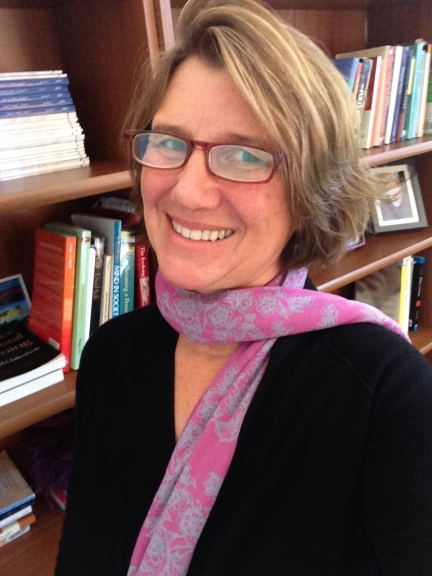Melissa Hammerle
Writing Center Interim Director, Assistant Professor of Education Studies

- Office
- Davis Library 225G
- Tel
- (802) 443-2384
- mhammerle@middlebury.edu
- Office Hours
- Summer 25: by appointment
Melissa Hammerle is the former director of the N.Y.U. Creative Writing Program and Co-Director of The Unterberg Poetry Center in New York City. She has for several years taught and supervised pre-service teachers in Vermont, focusing on the development of teaching competencies through contemplative, self-reflective pedagogies, social justice praxis, and creative inquiry. She has a doctorate in Educational Leadership and Policy Studies from UVM, where she completed research in contemplative education in the context of the intellectual, emotional and psychological growth of students and teachers. Her dissertation was entitled: “Conceptualizing Contemplative Practice as Pedagogy: Approaches to Mindful Inquiry in Higher Education.”
Melissa has taught methods courses for elementary and secondary teaching as well as literacy across the disciplines, the teaching process, literature and writing. At N.Y.U. she directed literacy programs in NYC public elementary and high schools, hospitals and women’s prisons. In her teaching and her research she is interested in the connection between engaged teaching and meaningful learning and the ways in which contemplative pedagogy can provide a mechanism to deepen learning through a process of embodied inquiry in which both student and teacher are actively engaged.
Courses Taught
EDST 0115
Current
Education In the USA
Course Description
Education in the USA
What are schools for? What makes education in a democracy unique? What counts as evidence of that uniqueness? What roles do schools play in educating citizens in a democracy for a democracy? In this course, we will engage these questions while investigating education as a social, cultural, political, and economic process. We will develop new understandings of current policy disputes regarding a broad range of educational issues by examining the familiar through different ideological and disciplinary lenses. 3 hrs. lect.
Terms Taught
Requirements
EDST 0237
Educational Psychology
Course Description
Educational Psychology: Learning in Schools
In this course we will expand our understanding of learning and teaching while exploring principles, issues, and research in educational psychology. We will examine learning theories, complex cognitive processes, cognitive and emotional development, and motivation, and apply these constructs to effective instruction, the design of optimal learning environments, assessment of student learning, and teaching in diverse classrooms. (Restricted to EDST majors, others by permission.) (EDST 0115) 3 hrs. lect.
Terms Taught
Requirements
EDST 0238
Ed Psyc: In the Community
Course Description
Educational Psychology: Learning in the Community
In this course we will expand our understanding of learning and teaching while engaging with the local school community, including professionals and stakeholders who support K-12 students in various roles. We will examine curriculum theory, teaching theories, and practices that support social-emotional as well as proficiency-based learning, trauma-informed teaching, and the use of personalized learning plans to support student growth and development. In this way, students will continue to understand and develop effective instructional practices, the design of optimal learning environments, meaningful assessment tools, and effective and engaging teaching strategies for diverse, inclusive, innovative, student-focused classrooms. (EDST 0237; Restricted to EDST Majors, and others by permission) 3 hrs. lect.
Terms Taught
Requirements
EDST 0500
Current
Upcoming
Independent Project
Course Description
Independent Project
(Approval Required)
Terms Taught
FYSE 1038
Models Contemplative Education
Course Description
Models for Contemplative Education: Mindful Inquiry and Learning
Contemplative education refers to a form of pedagogy that identifies the principles of embodied, mindful learning as integral to deep, engaged meaning-making. The field of contemplative studies informs this work, as educators develop new models of teaching that use critical first-person inquiry and mindfulness practices to foster sustained engagement. In this course we will explore the field of contemplative education and consider such questions as: what is learning and how does divergent or mindful thinking influence how we learn? Is there a connection between mindfulness and creativity, attention, memory? We will review research in the field and critically examine findings that suggest a correlation between contemplative practices and the intellectual growth and psychological well-being of students.
Terms Taught
Requirements
INTD 0132
Mindfulness & Conflict Skills
Course Description
Conflict Transformation: Mindfulness Skills as Educational Praxis
This course will introduce students to a variety of approaches to conflict transformation (CT) using skills-based practices from the fields of mindfulness and contemplative education. Conflict, as a personal or collective act of disruption, will be examined as a driver for social/political and individual change. We will examine this work through the theoretical lens of social justice and liberatory educational philosophies. Using these frameworks, we will also explore mindfulness-based skills as tools for engaged inquiry, including: identifying shifting conceptual frameworks and mindful states and employing embodied practices as learning praxis.
Terms Taught
Requirements
WRPR 0212
Issues & Methods Teach Writing
Course Description
Critical Issues and Methods in Teaching Writing: Process Pedagogy to Multiliteracies
In this course students will learn to work with writers from diverse backgrounds and disciplines while developing their own writing practices and habits. We will learn about writing pedagogy, tutoring strategies, and current topics in writing studies such as process pedagogy, technology and literacy, and multiliteracies. Students will explore multiple writing modalities while developing innovative teaching practices. Upon successful completion of the course, interested students will be invited to work as peer writing tutors in the Writing Center. 3 hrs. lect.
Terms Taught
Requirements
